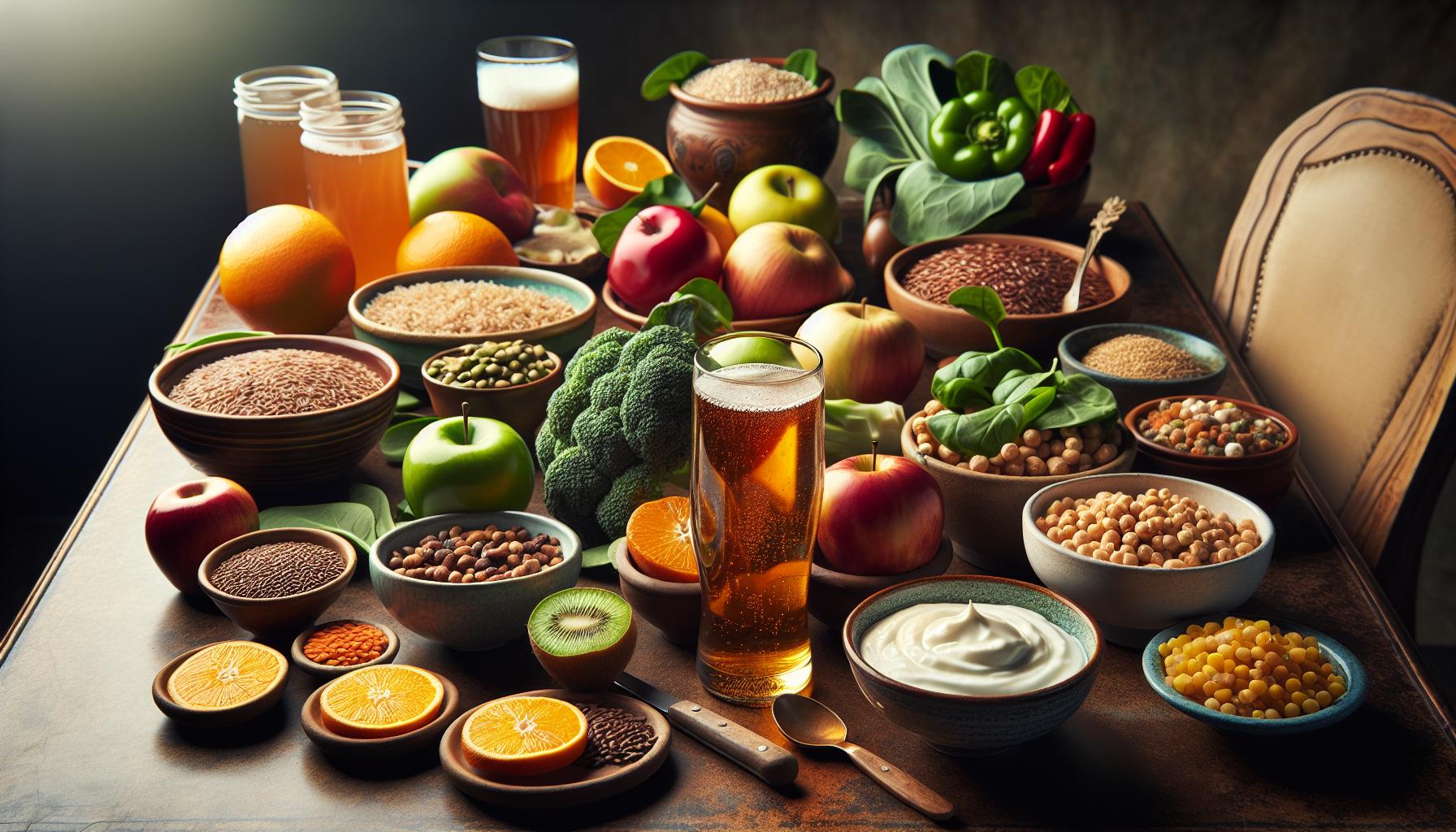Understanding what helps digestion – do you ever wonder why some foods leave you feeling like a bloated balloon while others have you zipping through your day with energy to spare? It all comes down to digestion, your body’s way of breaking down what you eat into nutrients it can use. What you choose to put on your plate can make or break this complex process.
What Helps Digestion: The Factors Affecting Digestion
Digestion is a complex process, influenced by multiple factors. By understanding these variables, you can take control of your digestive health more effectively.
Diet (obviously)
Stating what should be obvious: Your diet is the first thing to consider when it comes to influencing digestion. The types of food you consume have a significant impact on how well your digestive system functions. Here’s a quick overview:
- High-fiber foods, such as whole grains, vegetables, and fruits like pineapples, can help keep food moving through your digestive system, potentially reducing the chance of constipation.
- Lean (non convetional) proteins, including chicken, fish, and legumes, are pivotal in promoting a healthy digestive process without overburdening your gut.
- Healthy fats, found in nuts, seeds, and avocados, play an essential role in nutrient absorption.
But it’s not just about what you eat; it’s also about what you should limit:
- Processed foods and high-sugar snacks can disrupt your gut flora and lead to inefficiencies in digestion.
- Excessive alcohol and caffeine intake can irritate the digestive tract, leading to problems such as acid reflux or gastritis.
By keeping your diet varied and balanced, you’re setting the stage for optimal digestive performance.
Lifestyle
Your lifestyle can either be your digestive system’s ally or its adversary. Several lifestyle factors, when not moderated, can thwart the digestive process:
- Physical Activity: Regular exercise, including walking works wonders for your digestive system. It helps stimulate intestinal contractions, moving food through your digestive tract more smoothly.
- Hydration: Adequate fluid intake is key. Water helps digestion by dissolving fats and soluble fiber, allowing these substances to pass through more effortlessly.
- Smoking and Alcohol can have deleterious effects on your digestive health, leading to stomach ulcers and heartburn.
Incorporating exercise, drinking plenty of water, and moderating unhealthy habits is crucial for maintaining a robust digestive system.
Stress
The connection between stress and digestion is more significant than you might think. Stress sends signals to your gut that can precipitate or exacerbate digestive issues such as:
- Indigestion
- Irritable Bowel Syndrome (IBS)
- Ulcers
Stress management techniques are imperative for those who suffer from chronic digestive troubles. Practices such as meditation, deep-breathing exercises, regular physical activity, and even a weekly glass of red wine can mitigate the adverse effects of stress on your digestion.
Understanding the intricate links between your diet, lifestyle, and stress levels empowers you to make better decisions for your digestive health. Remember, every step towards a healthier digestive system is a step towards overall well-being.
Healthy Foods For Digestion

When it comes to digestion, the foods you choose to eat play a pivotal role. Certain foods can naturally enhance the digestive process, providing relief from discomfort and promoting overall gut health. Let’s dive into some of the best foods that can aid your digestive system.
Fiber-Rich Foods
You’ve likely heard that fiber is a cornerstone of a healthy diet, but you may not fully understand its impact on digestion. Dietary fiber, found in plant-based foods, aids digestion by helping to regulate bowel movements and preventing constipation. It also helps you feel fuller longer, which can aid in weight management. Include these fiber-rich foods in your diet for better digestive health:
- Whole grains like oatmeal and brown rice
- Legumes, including beans and lentils
- Fruits such as apples, berries, and pears
- Vegetables like broccoli, leafy greens, and carrots
Integrating a range of fiber-rich foods into your meals is a great strategy to improve digestion.
Probiotics
Probiotics are beneficial bacteria that play an essential role in maintaining gut health. They can help balance your gut microbiome, which is critical for proper digestion and can even bolster your immune system. To enjoy their benefits, include probiotic foods in your diet regularly. Some excellent sources of probiotics are:
- Yogurt with live cultures
- Kefir, a probiotic milk drink
- Sauerkraut and kimchi, which are fermented vegetables
- Kombucha, a fermented tea
Remember that not all yogurts and fermented foods have probiotics, so it’s vital to check for live cultures on the packaging.
Ginger and Peppermint
Let’s not forget about ginger and peppermint, two herbs known for their digestive benefits. Ginger, a natural anti-inflammatory, can help relieve nausea, improve gastric motility, and aid digestion. You might try adding fresh ginger to your dishes, or sipping on ginger tea, especially if you’re experiencing digestive discomfort.
Peppermint tea, on the other hand, has been used for centuries to soothe digestive issues. It relaxes the digestive tract muscles and can reduce symptoms of IBS, including bloating and abdominal pain. However, if you have heartburn or GERD, peppermint may not be the best choice for you, as it can sometimes worsen these conditions.
Incorporating ginger and peppermint into your diet, whether through teas, flavoring, or supplements, can promote a smoother digestive experience.
Remember, you’re unique and your body will respond to these foods in its own way, so it’s crucial to listen to your body’s signals and adjust your intake accordingly. Keep these dietary suggestions in mind and you may notice a marked improvement in your digestion.
Healthy Digestive Habits
Eat Regularly
Setting up a regular eating schedule can be transformative for your digestive health. When you eat at consistent times each day, you’re helping regulate your body’s internal clock, which can enhance enzyme release and improve gastric acid production. This regularity allows your digestive system to prepare in advance for food intake, leading to more efficient digestion.
Consider these tips for regular eating:
- Aim for balanced meals spread evenly throughout the day.
- If you prefer smaller meals, consider healthy snacking options.
- Avoid going long periods without food as this can disrupt digestive rhythms.
Chew Thoroughly
Chewing is the first, and one of the most critical, steps in digestion. It might seem trivial, but taking the time to chew thoroughly ensures that large food particles are broken down, easing the burden on the rest of your digestive system.
Here’s why proper chewing is essential:
- It breaks down food into manageable pieces, including the absorption of vitamins to help with digestion.
- Saliva, packed with digestive enzymes, starts the digestion of carbohydrates right in your mouth.
- Chewing signals the stomach to start producing acid in anticipation of the incoming food.
To make the most of your meals:
- Take smaller bites to make it easier to chew.
- Avoid distractions, like screens, during meals to better focus on chewing.
- Aim for 20-30 chews per bite to adequately break down food.
Stay Hydrated
Water and other fluids seem underrated as they play a role in digestion. They help dissolve fats and soluble fiber, allowing these substances to pass through more easily. Staying well-hydrated is a simple yet effective way to support your entire digestive process.
Keep these hydration pointers in mind:
- Drink plenty of water throughout the day, not just during meals. (try lemon water)
- Avoid excessive caffeinated or sugary drinks as they can dehydrate your body – but coffee in moderation can help with digestion
- Listen to your body’s thirst signals and respond appropriately.
By incorporating these habits into your daily routine, you’ll be taking positive steps toward maintaining a digestive system that works optimally. Remember to adjust these habits according to your body’s unique needs and responses.
Conclusion
Remember that your digestive health is a cornerstone of your overall wellness. It’s crucial to nurture it with the right foods, ample water, and good habits. By incorporating high-fiber foods, lean proteins, and healthy fats into your diet while steering clear of processed and high-sugar options, you’re setting the stage for a happier gut. Don’t underestimate the power of lifestyle choices—regular exercise, adequate hydration, and stress management can all have a profound impact on your digestion.


